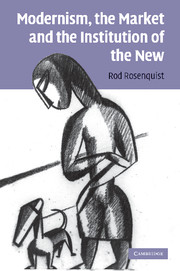Book contents
- Frontmatter
- Contents
- Acknowledgements
- List of abbreviations
- Introduction: The modernist latecomer and ‘permanent novelty’
- Chapter 1 ‘Changing the changing’: Wyndham Lewis and the new modernist ascendancy
- Chapter 2 Laura Riding, modernist fashion and the individual talent
- Chapter 3 The immolation of the artist: Henry Miller and the ‘hot-house geniuses’
- Chapter 4 Investing in the modernist legacy: Objectivist adventures in the ‘Pound tradition’
- Chapter 5 The last word: or how to bring modernism to an end
- Notes
- Index
Chapter 4 - Investing in the modernist legacy: Objectivist adventures in the ‘Pound tradition’
Published online by Cambridge University Press: 25 June 2009
- Frontmatter
- Contents
- Acknowledgements
- List of abbreviations
- Introduction: The modernist latecomer and ‘permanent novelty’
- Chapter 1 ‘Changing the changing’: Wyndham Lewis and the new modernist ascendancy
- Chapter 2 Laura Riding, modernist fashion and the individual talent
- Chapter 3 The immolation of the artist: Henry Miller and the ‘hot-house geniuses’
- Chapter 4 Investing in the modernist legacy: Objectivist adventures in the ‘Pound tradition’
- Chapter 5 The last word: or how to bring modernism to an end
- Notes
- Index
Summary
‘The older generation is not the older generation if it's alive & up … What's age to do with verbal manifestation, what's history to do with it … I want to show the poetry that's being written today – whether the poets are of masturbating age or the fathers of families don't matter.’
Louis Zukofsky, letter to Ezra Pound (P/Z 67)Henry Miller, marginal modernist though he may now seem, spent the 1930s finding room for himself between the high modernists, the Surrealists and mass-market fiction. This may seem an unusual position to be in, but it is not entirely unique, as examples from the same period of Gertrude Stein's career might illustrate. The late modernist period, in fact, often found individual writers struggling to accommodate their writing within an ever-changing literary field. When contrasting the birth years of some authors discussed – Stein was born in 1874, Wyndham Lewis in 1882, Miller in 1891, and Laura Riding in 1901 – it becomes clear that this is not purely a question of age or generation, but a specific problem facing those who are defined in relation to the programme of innovation that had been instituted in the 1910s and 1920s by the high modernists. Yet the question of generations which seems to hang over the heads of many modernist latecomers is one which must be examined from their own point of view.
- Type
- Chapter
- Information
- Modernism, the Market and the Institution of the New , pp. 138 - 174Publisher: Cambridge University PressPrint publication year: 2009



